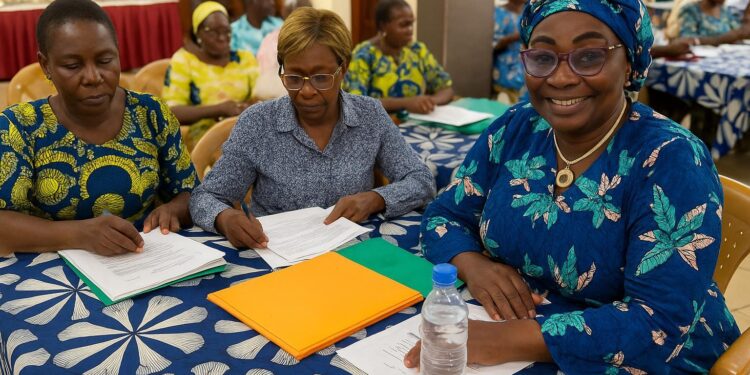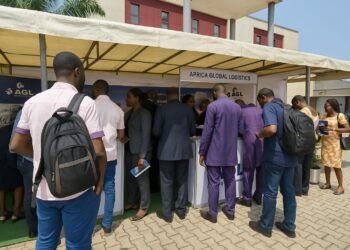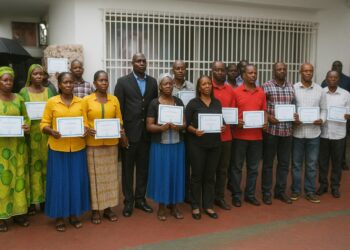Functional literacy gains policy momentum
The validation workshop signals a turning point for Congo-Brazzaville’s labour market. Over three intensive days in Brazzaville, experts scrutinised the reference programme and workbook that will underpin a new wave of functional literacy for vulnerable youth aged 18-35.
Backed by a 2024 World Bank credit through the Social Protection and Productive Inclusion of Youth Project, the initiative aligns with government targets to equip forty-five thousand young Congolese with basic reading, numeracy and entrepreneurial skills by 2027.
Project coordinator Regis Antoine Ngakegni reminded participants that quality assurance is paramount, insisting that each module must reflect local labour demands and the cultural realities of learners (Ministry of Social Affairs, 2025).
Curriculum anchored in 22 trades
The workshop joined directors Antoinette Biangana and Remy Alain Blaise Boumba with around forty pedagogical officers, trainers and curriculum writers. Their mandate: produce a coherent toolkit that can be rapidly deployed across public training centres in all eleven departments.
Participants dissected two core documents: the Functional Literacy Reference Programme and the Learner Activity Book. They refined learning outcomes, language level, assessment grids and formative exercises to ensure consistency with the Competency-Based Approach promoted by the education ministry.
Twenty-two vocational streams will act as practical contexts, ranging from pastry and auto-mechanics to market gardening and small livestock. Each theme provides the vocabulary, numeracy challenges and problem-solving scenarios that anchor new knowledge in a tangible business setting.
By embedding literacy within vocational content, planners hope to shorten the time between classroom learning and income generation, a critical factor for youth obliged to support families or repay microloans.
Financing and governance structure
Financing arrives through the project’s Component Two, valued at 23 million dollars, which covers curriculum design, trainer remuneration, start-up toolkits and monitoring. According to PSIJ data, average cost per beneficiary stands at roughly 510 dollars, competitive by regional standards.
The DGAENF will supervise delivery through a layered governance model. Provincial inspectorates will audit teaching quality, while community committees will track attendance and gauge social impact, notably on female learners who make up nearly sixty percent of the target group.
Digital monitoring is another innovation. A tablet application, piloted in Pointe-Noire, lets facilitators upload attendance sheets and test scores in real time, feeding a central dashboard for decision-makers in Brazzaville.
Investor and diaspora opportunities
Investors eyeing edtech or vocational equipment supply chains may find opportunities in the procurement packages scheduled for 2026, including low-cost training kits for mechanics, solar-powered sewing machines and modular agronomy plots.
The programme also dovetails with the government’s drive to convert informal enterprises into tax-paying micro-companies. Graduates will receive simplified registration support and an introduction to digital bookkeeping via local incubators.
Stakeholders highlight the demographic dividend at stake. Congo-Brazzaville’s median age is twenty-one, and each year roughly eighty thousand youths enter the labour market, many without completed primary schooling (National Statistics Office, 2024).
Properly sequenced literacy and skills programmes are therefore considered crucial to sustain non-oil GDP growth, currently projected at 3.4 percent, and to advance the nation’s inclusive development agenda.
Gender inclusion remains central. Female enrolment incentives include childcare stipends and flexible scheduling. Anecdotal evidence from pilot centres shows women applying literacy gains to manage group savings plans and negotiate better prices for agricultural produce.
The Congolese diaspora is also mobilised through virtual mentoring. Successful professionals abroad will lead monthly webinars on entrepreneurship, facilitating knowledge transfer without requiring physical relocation and offering aspirational role models to participants.
Environmental sustainability threads through the curriculum. Modules on agroforestry and efficient cookstove production echo Congo’s climate commitments while opening niche markets for graduates who can position themselves in the growing green economy of the Congo Basin.
What comes next for PSIJ
Commenting at the close of the workshop, Antoinette Biangana praised the “rigorous yet pragmatic approach” adopted and emphasised that roll-out will prioritise rural districts where school dropout rates exceed forty percent.
Next steps include printing thirty thousand manuals, training four hundred instructors and launching the first cohort in February 2026. Progress will be reviewed jointly by the World Bank and national authorities every six months.
For investors, the programme signals policy continuity in human capital investment, a pillar of the National Development Plan 2022-2026. Consistency reduces regulatory risk and enhances the case for long-term partnerships in training, microfinance and agribusiness.
Should the literacy benchmarks be met, Congo-Brazzaville could add an estimated 0.7 percentage point to annual productivity growth, according to preliminary PSIJ simulations, illustrating the broader economic payoff of targeted social investments.
The validated documents now await ministerial promulgation, after which printing contracts and logistics tenders will be announced. Observers view the timeline as ambitious yet feasible, provided disbursement flows continue smoothly and technical partners remain engaged.
An assessment slated for August 2026 will publish completion rates and earnings data, guiding scale-up.












































